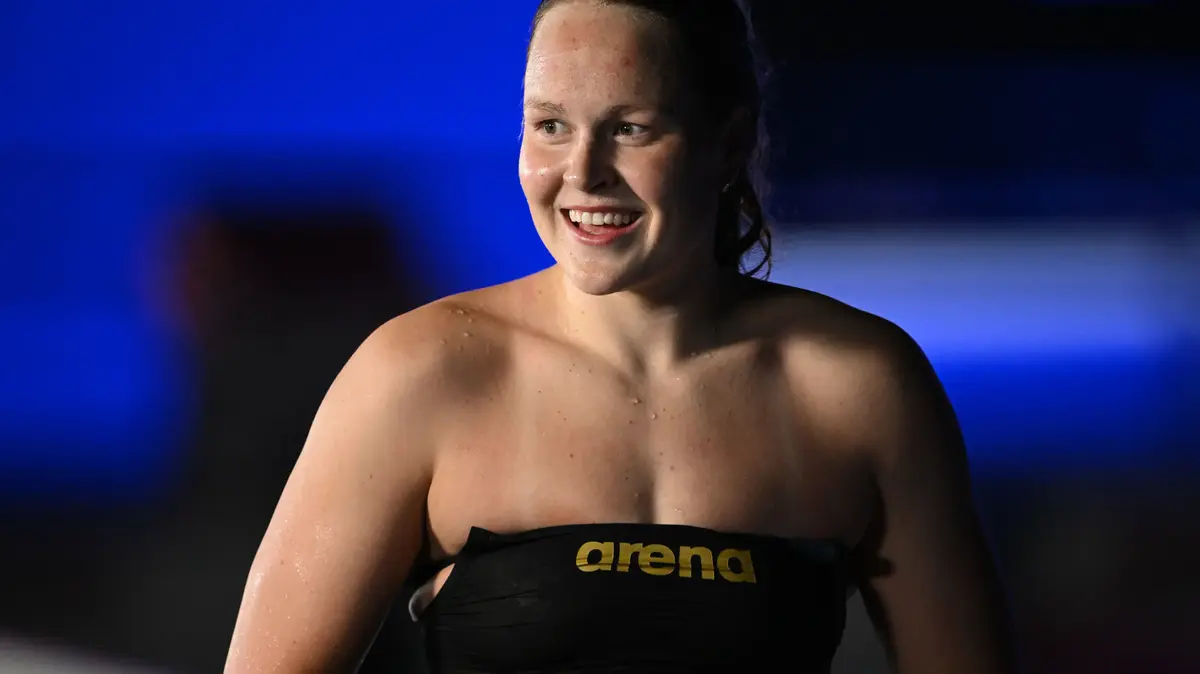Christof Wandratsch is in his element in ice-cold water
Photo: DB Volker Adam/ dpa
SPIEGEL:
How did you discover ice swimming for yourself?
Wandratsch:
I used to swim in pools and compete in open water World Cups.
After a successful crossing of Lake Constance, I sat down with friends and thought: What do we do now?
That's when we came across ice swimming.
This was not so well known in Germany in 2014.
We have seen that there are world championships.
I wanted to take part and be at the forefront if possible.
SPIEGEL:
When can you call yourself an ice swimmer?
Wandratsch:
As soon as you go into the water at a water temperature below five degrees and move there.
Neoprene items are taboo - no gloves, no shoes and no hats.
Only a swimming cap and earplugs are allowed.
SPIEGEL:
Is it true that a bit of body fat can be beneficial?
Wandratsch:
It is not a disadvantage if you have enjoyed cookies over Christmas.
Having two or three kilos more is not a mistake.
It warms a bit.
SPIEGEL:
Are you really swimming between ice floes?
Wandratsch:
I was once in Iceland for a photo shoot, so I swam around between icebergs.
At competitions in Russia, they cut the pool into a lake where the ice is three quarters of a meter thick in places.
There are trucks driving on the lake and we swim in it.
Unfortunately there is no snow at the World Championships in Poland this weekend, but the water is still only two degrees.
SPIEGEL:
What does a competition pool look like at the World Championships in Poland?
Wandratsch:
Like a normal swimming pool, 25 meters long with ten lanes.
But there are no starting blocks, you are not allowed to jump in.
That would be too dangerous in the cold water, the shock would be too great.
But then you swim quite normally: breaststroke or front crawl, even with your head under water.
SPIEGEL:
What are your goals for the World Cup?
Wandratsch:
I want to be at the top of my age group and finish in the top ten in the overall standings, especially on the long distances.
The competition is about 20 years old, I belong to the older generation.
SPIEGEL:
Deciding overnight to swim in ice water - it's definitely not that easy.
Wandratsch:
You have to start slow and listen to your body a lot.
I run aqua camps where I introduce people to ice swimming.
SPIEGEL:
What are your tips for beginners?
Wandratsch:
It is best to start in the fall when the water temperatures are slowly falling by going into an open body of water every day.
In the beginning it is enough just to sit down and feel the drop in water temperature.
The best thing to do is to only go in up to your hips, spray your arms and upper body, and only then squat down.
Gasping should be avoided in any case, just breathe calmly into your stomach.
SPIEGEL:
Do you remember your first time in cold water?
Wandratsch:
The first time it was below zero was in Finland, it was very, very hard.
That was in a different league than the lakes here in Bavaria.
I huffed a little then.
SPIEGEL:
What is the first part of your body you no longer feel?
Wandratsch:
Fingers get cold first and toes.
SPIEGEL:
And if you leave the water again?
Wall ratchet:
Warm up slowly.
If you swim 1,000 meters in Russia when the outside temperature is minus 20 degrees, you first hold your hands and feet under tap water.
Only then do you get lukewarm towels around your body.
If your temperature is normal, you go to the sauna.
After training at home, I get dressed again as quickly as possible.
SPIEGEL:
It could be difficult to find icy waters in Germany during the summer months, right?
Wandratsch:
I also train in normal pools.
But I have two training waters that only have eight degrees in summer.
When I give my camps we are at a glacial lake.
It's minus 0.4 degrees all year round.
SPIEGEL:
The sport seems to be very risky.
What dangers are there?
Wandratsch:
You have to prepare well and should never train alone, not run or jump into it.
You have to be able to get dressed quickly afterwards.
Skinny pants are not as suitable as comfortable jogging pants.
MIRROR:
How long can the body endure the cold water?
Wandratsch:
As a rule of thumb, a beginner should only swim about one minute per degree at the beginning.
As professionals, we are in the water for between five and 15 minutes, depending on the training.
I'm in the fortunate position that I can swim the 1000 meters quite quickly.
But hats off to the people who need 25 minutes for this route.
That's insane.
SPIEGEL:
Good swimming technique is therefore important.
Wandratsch:
Yes, that is an advantage.
But going in at all is a big step.
It strengthens your immune system.
I know people who started it and haven't had a cold since.














